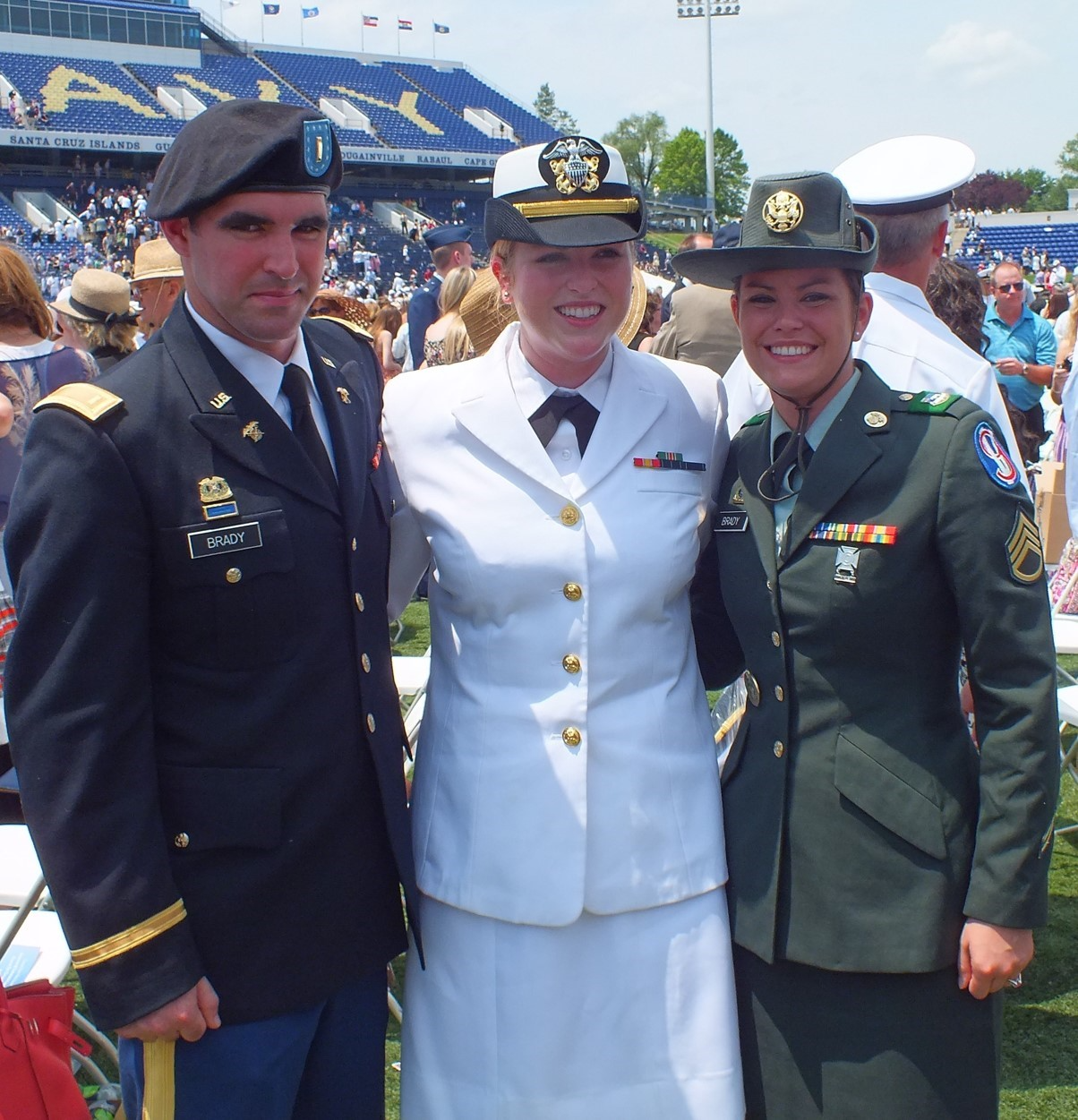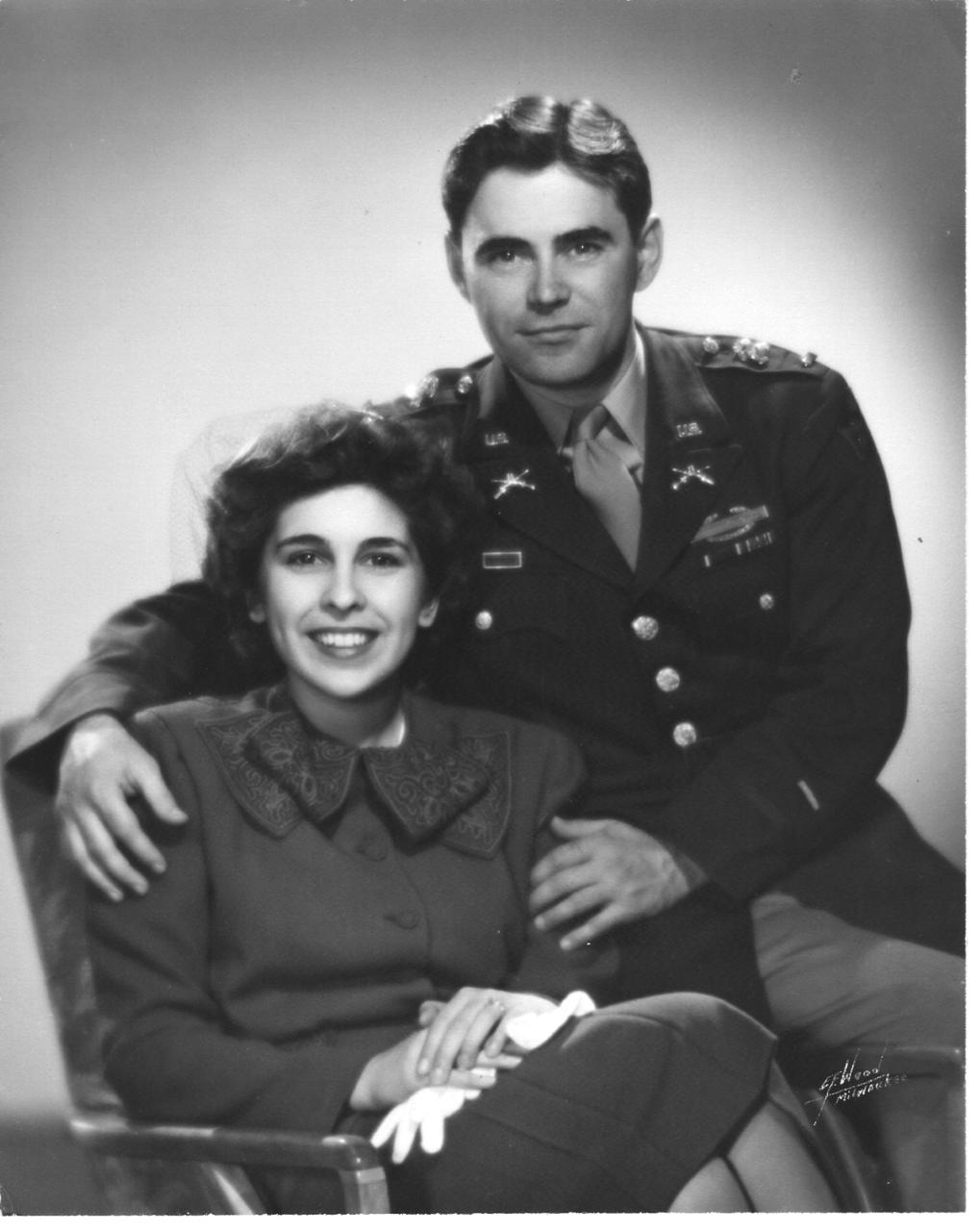
Henry Brady (left), Kerry Roach and Elizabeth Brady at Kerry’s graduation from the United States Naval Academy. (Submitted photo)
Last September, Archbishop Jerome E. Listecki urged Catholics to return to in-person Mass, noting that fear of getting sick is not a valid excuse for non-attendance. He said Catholics “who deliberately fail to attend Sunday Mass commit a grave sin.”
Though live-streamed and publicly broadcast Masses helped the homebound feel connected during the lockdowns, they didn’t replace in-person attendance.
Michael Brady can’t comprehend the lack of desire to attend Mass. A lifelong Catholic, he and his wife, Donna, were married at St. Rose of Lima Parish 48 years ago. He has belonged to the parish for 50 years and attended Holy Cross School, Marquette High School, and Marquette University. He has helped lead the annual Irish Fest Mass and is preparing for the festival’s return this year, especially the Mass, Aug. 22.
“It is important to get Catholics in Milwaukee to return to Mass and Holy Communion safely with the onset of the vaccines to prevent the spread of COVID-19,” he said. “In discussing this with family members, I came across letters from my grandfather, Joseph Edwin Brady, written Sept. 18, 1918, from France, where he was on the front lines of World War I; from my father, Joseph Paul Brady, written April 13, 1944, from England as he was preparing for D-Day in World War II; and, from my niece Kerry Roach, who is currently on the USS Somerset somewhere in the Pacific with 800 other Navy Sailors and Marines.”
Each of the three writes about the blessings of Mass and Holy Communion and how valuable it was for them, especially since accessibility was an issue. They never took it for granted — in fact, they longed for the Mass and Holy Communion.
In excerpts from his letter, Brady’s grandfather, Joseph Edwin, writes that he is happy his family has Masses said for his safe return. He credits God for keeping him from being afraid.
“I go to Communion as often as possible, and this morning had the pleasure of receiving our dear Lord in Holy Communion near the front lines and intend again to receive him tomorrow (ready for the big show). If you only knew how happy you make me when I read in your letters about seeing a priest. It fills me with such great joy to think that on my return, my sweet loving wife may be of my faith. If so, I will be the best daddy the world knows of. May God bless your efforts, for your success means my eternal salvation. This morning in receiving Holy Communion, I received it in a woods where our chaplain said Mass. So, you see we receive on almost every spot in France.”
Brady’s father, Joseph Paul, was born in 1913 and graduated from De La Salle High School in Chicago. After the war, when he was a first lieutenant in the Army, he married Kathryn, who also converted to Catholicism.
“My dad graduated from Marquette University in 1950 and received a master’s degree in social work in 1952. He worked for Marquette for over 25 years,” said Brady. “He attended daily Mass at Holy Cross (now St. Anthony of Padua East) and on Sunday mornings, drove persons who were blind to Holy Cross, among many other good deeds.”
In one of Joseph Paul’s letters, he writes: “I will be needing a lot of prayers then, and if possible, Mass for my special situation would serve a good purpose.”
Brady’s niece, Kerry Roach, the daughter of his brother Dan, serves as a lieutenant commander in the Pacific Ocean in the U.S. Navy. She and her husband, Jordon Roach, are both Naval helicopter pilots.
Kerry writes in an email that two onboard chaplains are available to serve the 400 Sailors and 400 Marines. While the chaplains support all religious backgrounds and provide a Protestant religious service on Sundays, the Catholic servicemen and women miss Sunday Mass.
“A couple times throughout the deployment, we had Fr. Dwyer, a priest from the USS Makin Island, flown over for a few hours to give Mass and offer confessions on a helicopter fondly referred to as a ‘holy helo.’ (Fun fact: on my first deployment, I often flew the ‘holy helo’ from the aircraft carrier to nearby smaller ships but didn’t appreciate the importance of that mission until years later.) Mass and confession were always well-attended during these occasions because it was often months between visits, and we never knew when the next visit would be.”
To help keep the onboard Catholic community strong, Kerry began serving as a lay leader on board. Each Sunday, she led the service with the caveat, “Unfortunately, we are not able to celebrate the Mass because we do not have a priest. Let us be unified in the spirit of Christ with the Church around the world and celebrate your redemption in Christ’s suffering, death and resurrection.”
While it was fulfilling to lead the group, Kerry often felt like a disappointment. She knew she couldn’t serve the community as a priest could, and she often felt the crew’s yearning for Confession and Holy Communion. Sometimes, only a handful of crew members would attend the prayer group, and Kerry worried the Catholic community was falling apart.
“When I needed it most, God would remind me that he was present with us on the deployment, and we were not forgotten,” she said. One such reminder occurred when I received an email from a fellow Naval Academy graduate stating how much she enjoyed praying the rosary in the evenings at the Academy and asking if we had anything similar onboard. Within days after that conversation, we started up a rosary prayer group, which met on Thursday and Sunday evenings. The rosary group had a surprising attendance turnout — people who I’d never seen at other Bible studies or lay-led services showed up with their rosaries in hand. During the seemingly endless days of deployment, our common hope to return home to where we could celebrate Mass strengthened the bond of the Catholic community onboard. Mass was something we would never take for granted again.”




